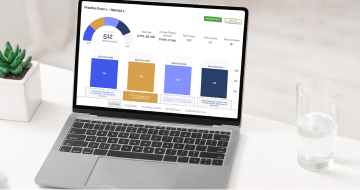Molecular Formula versus Empirical Formula
MCAT General Chemistry Chapter 1 - Section 1.1 - Stoichiometry
- Home
- »
- MCAT Masterclass
- »
- Chemical and Physical Foundations of Biological Systems
- »
- General Chemistry
- »
- Stoichiometry
- »
- Chemical Formula
- »
- Molecular Formula Versus Empirical Formula – MCAT General Chemistry
Sample MCAT Question - Molecular Formula versus Empirical Formula
A carbohydrate with the empirical formula CH2O has a molar mass of 150 g/mol. What is the molecular formula of this compound?
a) CH2O
b) C3H6O3
c) C5H10O5
d) C7H14O7
C is correct. C5H10O5.
The molecular formula is a multiple of the empirical formula, so the molar mass of CH2O times a whole number should equal 150 g/mol. The molar mass of CH2O is 12 g/mol (C) + 2 g/mol (2 H) + 16 g/mol (O) = 30 g/mol. This implies the molecular formula is 5-fold greater than the empirical formula, since 150 / 30 = 5. Therefore, we can multiply the subscripts of our empirical formula by 5 to obtain the molecular formula as such: (CH2O) x 5 = C5H10O5.
Get 1-on-1 MCAT Tutoring From a Specialist
With MCAT tutoring from MedSchoolCoach, we are committed to help you prepare, excel, and optimize your ideal score on the MCAT exam.
For each student we work with, we learn about their learning style, content knowledge, and goals. We match them with the most suitable tutor and conduct online sessions that make them feel as if they are in the classroom. Each session is recorded, plus with access to whiteboard notes. We focus on high-yield topics if you’re pressed for time. If you have more time or high-score goals, we meticulously cover the entire MCAT syllabus.
Stoichiometry
Molecular Formula
Empirical Formula
Explore More MCAT Masterclass Chapters
Take a closer look at our entire MCAT Masterclass or explore our Biochemistry lessons below.

One-on-One Tutoring
Are you ready to take your MCAT performance to a whole new level? Work with our 99th-percentile MCAT tutors to boost your score by 12 points or more!
See if MCAT Tutoring can help me
Talk to our enrollment team about MCAT Tutoring

MCAT Go Audio Course
Engaging audio learning to take your MCAT learning on the go, any time, any where. You'll be on the way to a higher MCAT score no matter where you are. Listen to over 200+ lessons.

MCAT Practice Exams
Practice makes perfect! Our mock exams coupled with thorough explanations and in-depth analytics help students understand exactly where they stand.

MCAT Prep App
Access hundreds of MCAT videos to help you study and raise your exam score. Augment your learning with expert-created flashcards and a question banks.